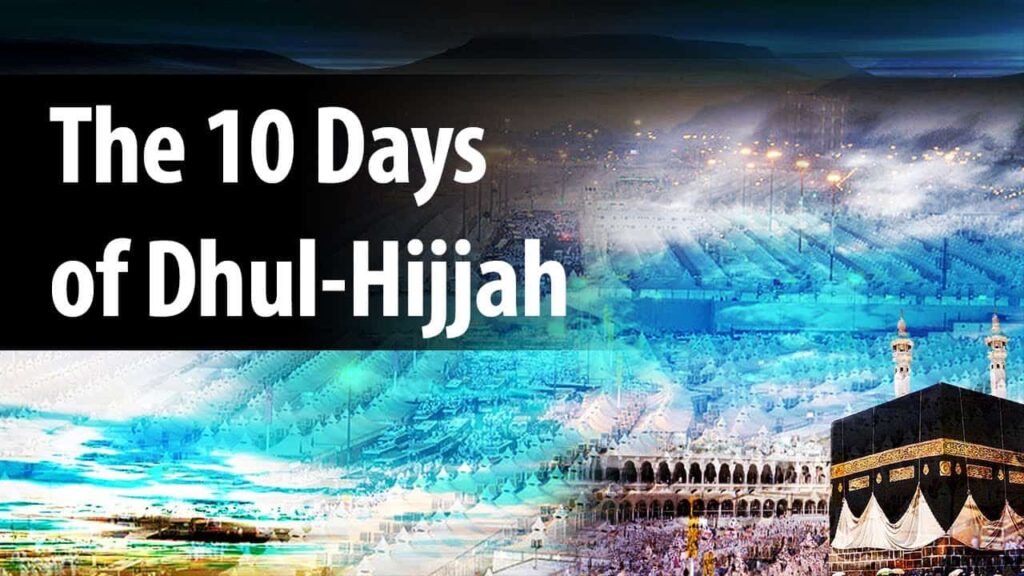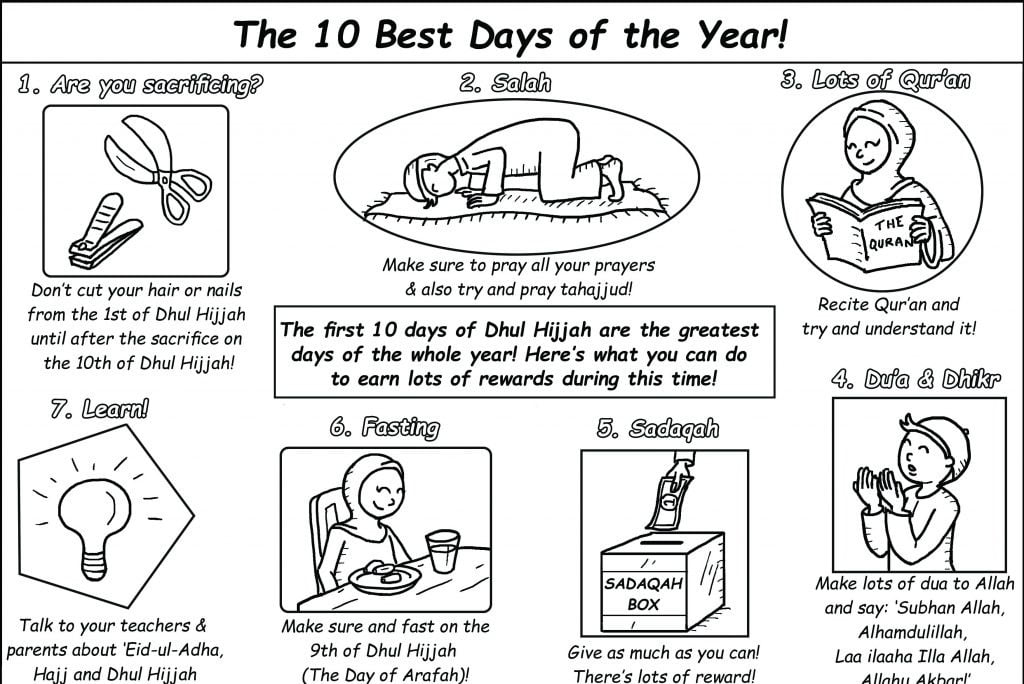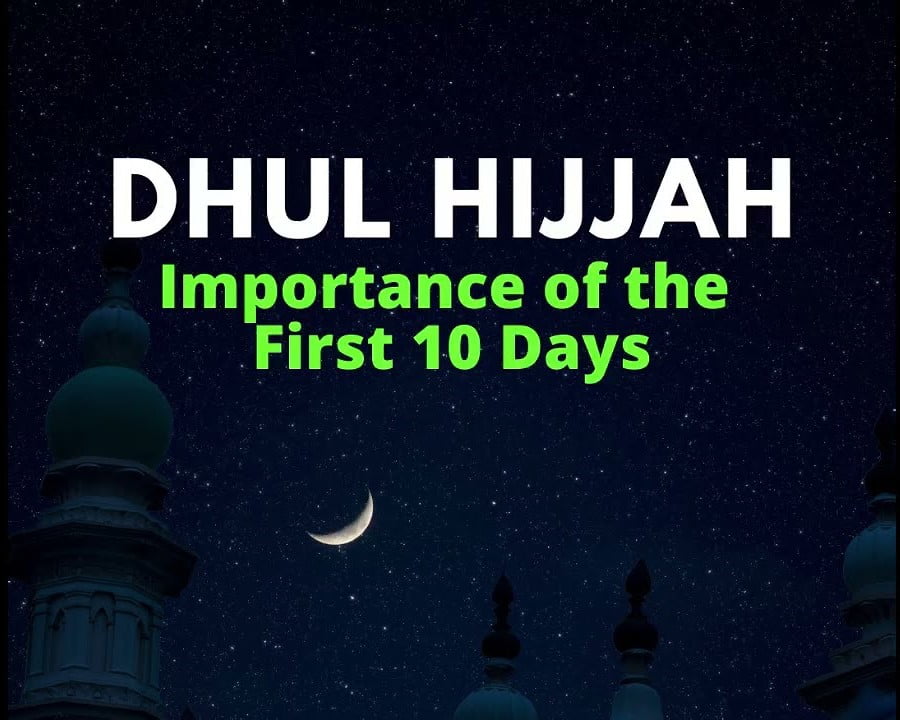The first ten days of Dhul-Hijjah are the first ten days of Dhul-Hijjah month, and are considered one of the greatest times and times. Allah has favored it, distinguished it from other times, and distinguished it from other times with many virtues and features. To sharpen enthusiasm and determination, and to seek to increase wages and good deeds.
As the mothers of worship gather there; Such as prayer, fasting, Hajj, etc., and this does not happen on other than ten days of the year. Scientists have explained that the first ten days of Dhul-Hijjah are better than the last ten days of Ramadan, while the last ten nights of Ramadan are better than the ten nights of Dhul-Hijjah.
What is the month of Dhu al-Hijjah?
The month of Dhu al-Hijjah is one of the twelve Hijri months and is famous for being the month of Eid al-Adha, which is the second month in order after the month of Dhu al-Qa’dah. The virtue of the month of the first ten days of Dhul-Hijjah is considered great, as it is one of the holy months in Islam, and it has great importance for Muslims all over the world.
The virtue of month of Dhu al-Hijjah

It is important to realize that the first ten days of Dhul-Hijjah are characterized by great virtue and status in Islam. One of the greatest acts of worship that can be performed this month is performing the Hajj, which is considered one of the five pillars of Islam.
Muslims from all over the world head to the Holy House in Mecca in the month of Dhu al-Hijjah to perform Hajj, which is a duty that brings together Muslims of all races, nationalities and cultures.
What is the virtue of the first ten days of Dhul-Hijjah?
The first ten days of Dhul-Hijjah have special merit in Islam. According to the Hijri calendar, the month begins with the appearance of the crescent moon and lasts for ten days. These days are considered blessed days, and Muslims are encouraged to take advantage of them with acts of worship and obedience.
One of the recommended deeds during the first ten days of Dhul-Hijjah is to fast on the ninth day of Dhul-Hijjah, which is the day of Arafat that precedes the day of Eid, and its fasting is considered one of the best fasts after Ramadan.
The virtue of fasting the first ten days of Dhul-Hijjah
According to the hadiths of the Prophet, fasting the first ten days of Dhul-Hijjah is considered one of the good deeds for which the reward is doubled. Muslims are encouraged to fast for nine days, starting from the first ten days of Dhul-Hijjah until the Day of Arafat, which is the day pilgrims stand at Arafat.
One of the virtues of the month of Dhul-Hijjah is that the day of Arafah is considered an opportunity to repent and seek forgiveness, and fasting Dhul-Hijjah is considered a confirmed Sunnah from the Prophet Muhammad, may Allah bless him and grant him peace.
Ruling on fasting the first ten days of Dhul-Hijjah
The jurists considered it desirable to fast the first ten days of Dhul-Hijjah, with the exception of the blessed day of Eid al-Adha. That is, the Day of Sacrifice; It is the tenth day of Dhul-Hijjah. It is forbidden for a Muslim to fast on the day of Eid, according to the agreement of the jurists.
Although there is no proven evidence of the desirability of fasting these nine days, the jurists cited the generality of the evidence for the desirability and virtue of fasting, and the fact that fasting is one of the actions that the Prophet – may Allah bless him and grant him peace – encouraged.
Recommended acts of worship during the first ten days of Dhul-Hijjah
A Muslim should invest the first ten days of Dhul-Hijjah in many acts of worship and good deeds, including:
- Performing the rituals of Hajj and Umrah is the best form of worship performed in Dhul-Hijjah. It was proven in the Sahih on the authority of Abu Hurairah – may Allah be pleased with him – that the Prophet – peace and blessings be upon him – said: (Umrah to Umrah is atonement for what came between them, and the accepted Hajj has no reward except Paradise).
- Fasting, especially fasting on the Day of Arafah, and the virtue of its fasting was mentioned in the words of the Prophet – may Allah bless him and grant him peace -: (Fasting on the Day of Arafah, I hope that Allah will atone for the year before it, and the year after it).
- Takbeer, praise, tahlil, and remembrance; These are the days in which the information was encouraged to do so. Repentance, seeking forgiveness, and abstaining from sins and transgressions. Getting closer to Allah through prayer, supplication, enjoining what is right, and forbidding what is wrong.
- The sacrifice is in imitation of the Prophet – peace and blessings be upon him -; It was proven that Anas bin Malik – may Allah be pleased with him – said: (The Prophet – may Allah’s prayers and peace be upon him – sacrificed two salt-horned rams, slaughtered them with his hand, said the name “Allahu Akbar” and said “Allahu Akbar” and placed his foot on their sides).
- Performing various good deeds, such as charity, reading the Qur’an, honoring the guest, maintaining family ties, guarding the tongue, honoring one’s parents, praying for them, making sure to perform the Sunnah prayers, bringing joy to the hearts of others, and other good deeds. Make sure to perform the Eid prayer.
What is the ruling on shaving during the first ten days of Dhul-Hijjah?
There were many opinions of the jurists regarding the ruling on removing some of the hair from the head during the first ten days of Dhul-Hijjah for those who want to sacrifice, and their statements were as follows:

- The Hanafis said that it is not disliked to shave hair from the body.
- The Malikis and Shafi’is held that the Sunnah requires not removing any body hair, whether from the head or otherwise, or trimming the nails, for anyone who wants to sacrifice or knows that someone else is sacrificing for him, from the beginning of the month of Dhul-Hijjah until the sacrifice is completed.
- The Hanbalis said that it is obligatory not to remove hair from the body, and the obligation was transmitted from Saeed bin Al-Musayyab, Rabi’ah, and Ishaq.
- The basis for this is the hadith of the Prophet – peace and blessings be upon him – which was reported on the authority of Umm Salamah – may Allah be pleased with her -; He said: (When the first ten days have begun, and one of you wants to make a sacrifice, let him not touch anything of his hair or skin.).
Conclusion
One of Allah’s blessings to His servants is the virtue of the first ten days of Dhul-Hijjah, and the Messenger calls us to do more good deeds during them. Because work during this period has a great status with Allah Almighty, and for the first ten days of Dhul-Hijjah one of the reasons for preference has been gathered.
That these days are among the sacred months, and that there is the Day of Arafat in them, and investing these days is through sincere repentance, adherence to the truth, and holding fast to the strong rope of Allah.

